Tech Job Market in Ukraine, July 2023 Update
Welcome to the July edition of our market report. All the numbers are based on user activity on Djinni, Ukraine's biggest tech job marketplace.
Key points:
The number of candidates exceeds available jobs by a factor of 9.
Middle-senior tech candidates have experienced an average salary decrease of 10%.
The average monthly number of applications for senior positions has increased by 200% over the past year.
Hiring in programming categories has decreased, except for Python.
Competition among inexperienced candidates for jobs has decreased from 45 candidates per job to 35, mainly due to sales and support vacancies.
Marketing vacancies have surpassed JavaScript as the dominant job category.
Competition has increased from 8.5 to 9.15 candidates per job
As of the beginning of July, there are 87.6K candidates available on Djinni (an 8% increase compared to the previous quarter) and 9.6K jobs online (a 1% increase from the last quarter). The competition across all categories is 9.15 candidates per job, which is 8% higher than the previous quarter and 150% higher compared to July 2022.
The market is toughest for QA specialists, as their competition has increased even further from 30 candidates per job to 36 since April 2023.
Among senior positions, the HR and Creative categories are the most competitive. As a result, many senior candidates tend to apply for jobs that require less experience than they possess.
Candidates specializing in Marketing and Sales are likely to find a more welcoming market, especially if they have one to three years of experience. There is also higher demand for middle and senior professionals in DevOps and Security.
Salaries for middle-senior level tech candidates have declined by 10%
*Refer to this dashboard for more information: https://bit.ly/yoysalary.
On average, monthly salaries for middle-senior tech professionals have decreased by $200-500 compared to the previous year's second quarter. However, salaries for junior-level candidates and those with the highest level of experience have remained unchanged.
There has been an increase in average salaries for DevOps specialists. Conversely, frontend developers hired this year are experiencing lower compensations across all experience levels. Expert-level candidates, in particular, are seeing a significant decrease of $1,500 compared to what they could have expected in 2022.
Despite the downturn in the market, hiring remains stable
On Djinni, candidates have the option to report if they were hired after a contact made through the platform, and companies confirm these reports. During the second quarter of 2023, approximately 3,000 hires were reported. This number is similar to the previous quarter and is 6% lower compared to Q2 2022.
May was the most successful month, with more hires than the same month in 2022 and 2023.
Non-technical hires account for 21% of all hires
Despite Djinni being primarily a tech job marketplace, IT companies also use it to find specialists in Marketing, Sales, design and some other non-technical roles.
While developers still make up the largest group of hires, their share decreased from 47% in Q2 2022 to 43% in the last quarter. Conversely, the share of non-tech hires grew from 18% to 21%.
Hires in programming categories are down, except Python
JavaScript continues to be the largest category in terms of hires; however, the number of frontend developers hired has declined by 16% year over year. A similar trend is observed in the second-largest group, Manual QA. Among the major development categories, only Python specialists are currently in higher demand compared to the previous year.
On the other hand, non-tech categories such as Design, Sales, Support, and Lead Generation show positive trends. In particular, Lead Generation hires have quadrupled, increasing from 12 hires per quarter to 60.
Approximately 37% of hired candidates have over 5 years of experience, which is a slight increase from the previous quarter's 35%. Candidates without commercial experience make up only a 10% share of hires, the same as the previous quarter.
Competition among trainees has decreased by 20%
The competition among candidates without experience is slowing down. Last quarter, it was 45 candidates per job, whereas now it is 35. However, this decrease did not affect novice developers (their competition increased from 135 to 167) and QAs (from 300 to 358).
This is because the number of jobs that do not require experience has increased, but most of them are for non-technical specialists. Meanwhile, an increasing number of developers and QAs are entering the market after completing short courses.
New job postings increased quarterly for both senior and trainee positions.
In Q2 2023, recruiters posted 26.6K new jobs, marking a 2% increase from the previous quarter but a 25% decrease compared to the second quarter of 2022.
Job openings for senior positions saw an 11% growth compared to the previous quarter, primarily in the developer and DevOps fields. In an oversaturated market, companies tend to prefer hiring candidates with more experience.
Conversely, job opportunities for candidates without experience also increased by 22% compared to the previous quarter. However, this growth was not observed in the tech sector. The majority of available jobs for career switchers or newcomers are in Marketing, Sales, and Support roles.
Marketing surpasses JavaScript as the dominant category in jobs
For the first time since 2019, the JavaScript category has lost its lead. In Q2 2023, there were 2,783 new job openings for marketers, compared to 2,421 for frontend positions.
It is worth mentioning that Marketing experienced a surge in popularity at the beginning of the pandemic. Meanwhile, the growth in the Sales category's ranking is unprecedented. The Sales category currently holds the third position, surpassing DevOps, PHP, and Java.
Candidates send 5 times more job applications than receive propositions
In June, recruiters initiated contact with candidates on Djinni a total of 63 thousand times. This represents a 13% decrease compared to May and the lowest number since the start of the pandemic. During the same period, candidates sent a staggering 310,000 job applications.
*Note: Candidate profiles on Djinni are anonymous, so communication can only be initiated if a candidate expresses interest in a job offered by a recruiter or if they apply for vacancies themselves.
On average, a vacancy receives 18 applications
On average, each vacancy receives approximately 18 applications. Vacancies without experience requirements tend to receive the highest number of applications, averaging around 33 in June. Trainee frontend and QA positions attracted hundreds of candidates, with a record number of 1,016 applications for a trainee frontend position and 978 applications for a Junior QA role in a single month.
The number of applications for vacancies with high requirements has been steadily increasing, from 4 in July last year to 10 in June 2023.
In June, a total of 35 thousand candidates submitted all the applications (out of the 87,000+ candidates currently searching for a job). The median number of applications per candidate is 4, with 9,400 candidates applying for 10 or more jobs in a month. The largest share of applications came from candidates with 1 year of experience, accounting for 30% of the total applications.
Recruiters show increased interest in junior-middle candidates
The proportion of recruiter propositions received by candidates with no experience has risen from 1.5% a year ago to 5% currently.
Another segment gaining popularity is candidates with 1 or 2 years of experience. Their share of attention from recruiters has increased from 12% to 20%.
This increase has had minimal impact on developers and QAs. 27% of propositions for candidates with up to 3 years of experience are in the fields of Marketing, Sales, and Lead Generation.
Three categories account for 50% of all job applications
Three categories, namely JavaScript, QA, and Design, account for 50% of all job applications this quarter. To compare, these categories make up almost 40% of active candidates.
Recruiters' messages are more diverse in their structure. The category that receives the largest share of propositions is Marketing. In June, these candidates received 10.5% of inbound messages, while sending only 3% of the applications. JavaScript ranks second with 8.2% of propositions, but frontend candidates account for 26% of all job applications.
Although Lead Generation receives slightly more than 2% of recruiters' messages, there is a limited availability of candidates in this category. As a result, Lead Generation stands out as the leader in terms of messages per candidate, with over 5 messages. Even DevOps, which used to be the most in-demand category, receives less than 4 messages per candidate.
25% of jobs online on Djinni are from companies who have offices outside Ukraine
While the majority of jobs posted on Djinni are from Ukrainian companies, it is noteworthy that 25% of the jobs available on the platform are from companies with offices located outside Ukraine. Among these companies, Poland has the highest representation, accounting for 15% of the jobs currently online. Following Poland, Cyprus and Germany have 3% and 2% of the jobs respectively. 13% of jobs on Djinni are from international companies that do not have offices in Ukraine.
Among the international jobs available on Djinni, 50% are fully remote positions, allowing candidates to work from anywhere. Additionally, 35% of international jobs provide candidates with the option to choose between remote work or working from the company's office. Ukrainian companies are twice as likely to invite candidates to their office locations, indicating a preference for in-person work arrangements.
Only 15% of jobs offered by international companies provide relocation opportunities for candidates, and only 11% cover the expenses associated with relocation.
Interestingly, companies with offices in Cyprus are more likely to offer relocation options, with 26% of their job postings including relocation opportunities.
27% of candidates on Djinni are from outside Ukraine
Although the majority of candidates available on Djinni are still from Ukraine, the share of foreign candidates is steadily increasing, rising from 26% in the previous quarter to 27% currently.
The most popular countries among these foreign candidates are Poland and Azerbaijan (the positions of these two countries have swapped since the last quarter), followed by Nigeria. Germany has surpassed Kazakhstan and now ranks fifth in the candidate distribution.
Furthermore, the share of EU candidates has also seen a slight increase, growing by one percentage point from 9% to 10%.
Foreign candidates account for 13% of this year's reported hires on Djinni. The most popular locations for hiring these candidates remain Poland, Azerbaijan, and Spain, which have maintained their positions from the previous quarter.
Conclusions
It was a recruiter's market at the beginning of the year and still is, even more so. The competition among candidates continues to increase, with fewer jobs resulting in more applications and smaller salaries. QAs, developers, and designers, freshly graduated from IT schools, face intense competition with hundreds of candidates vying for a single job. Even experienced professionals find themselves applying for multiple positions, including those that require less experience and offer lower compensation.
Companies have shifted their focus towards non-technical candidates, particularly those who can contribute to acquiring more clients. The hope is that these newly hired Sales and Marketing professionals will help IT companies secure more clients, leading to increased opportunities for hiring developers once again.
Thank you for reading.
Follow us on LinkedIn for more news and market updates
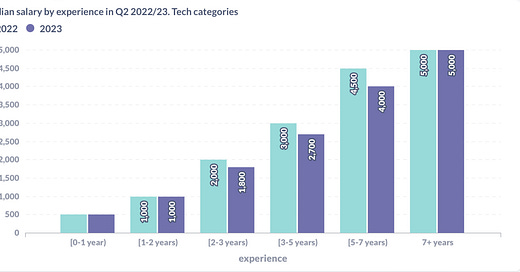






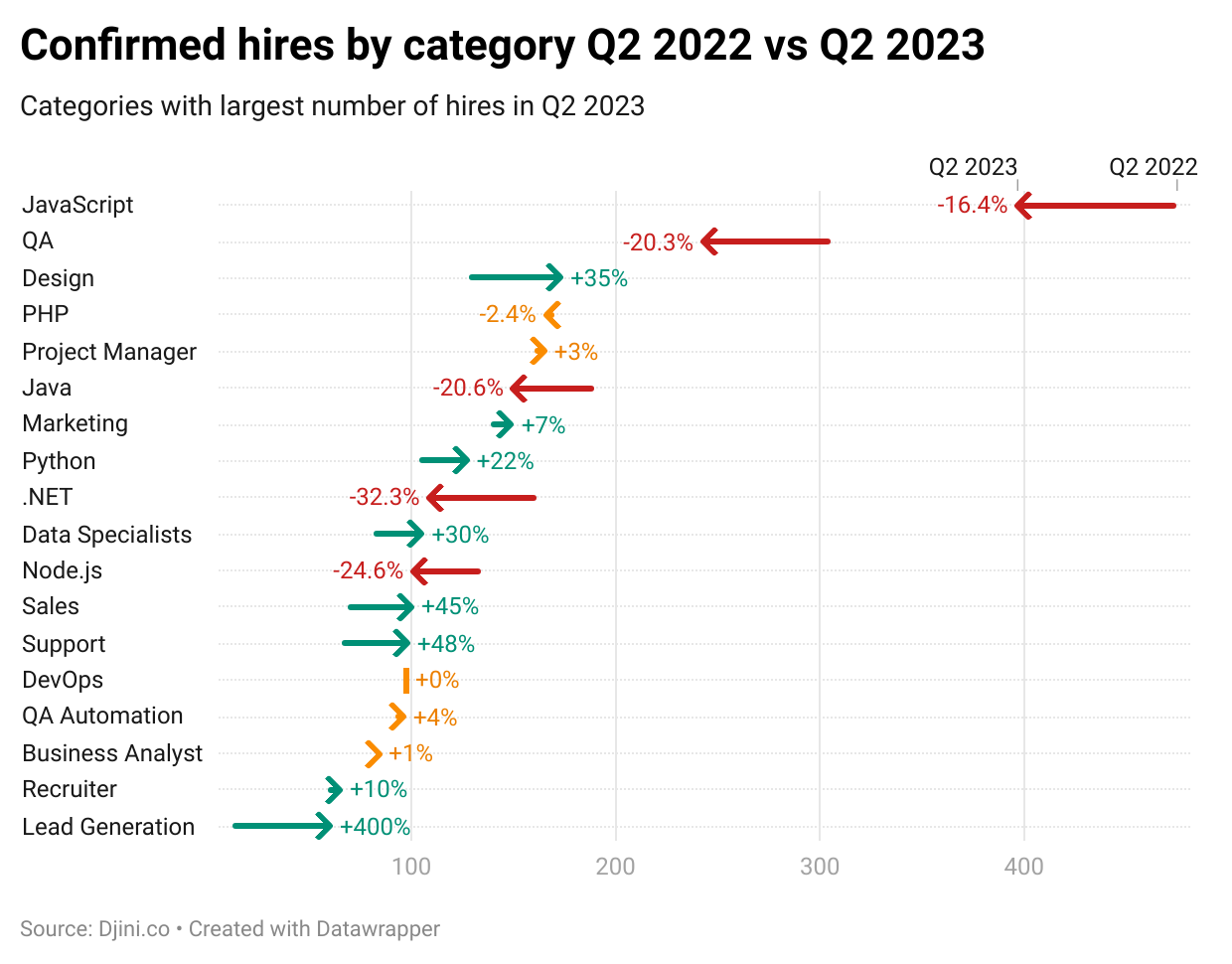

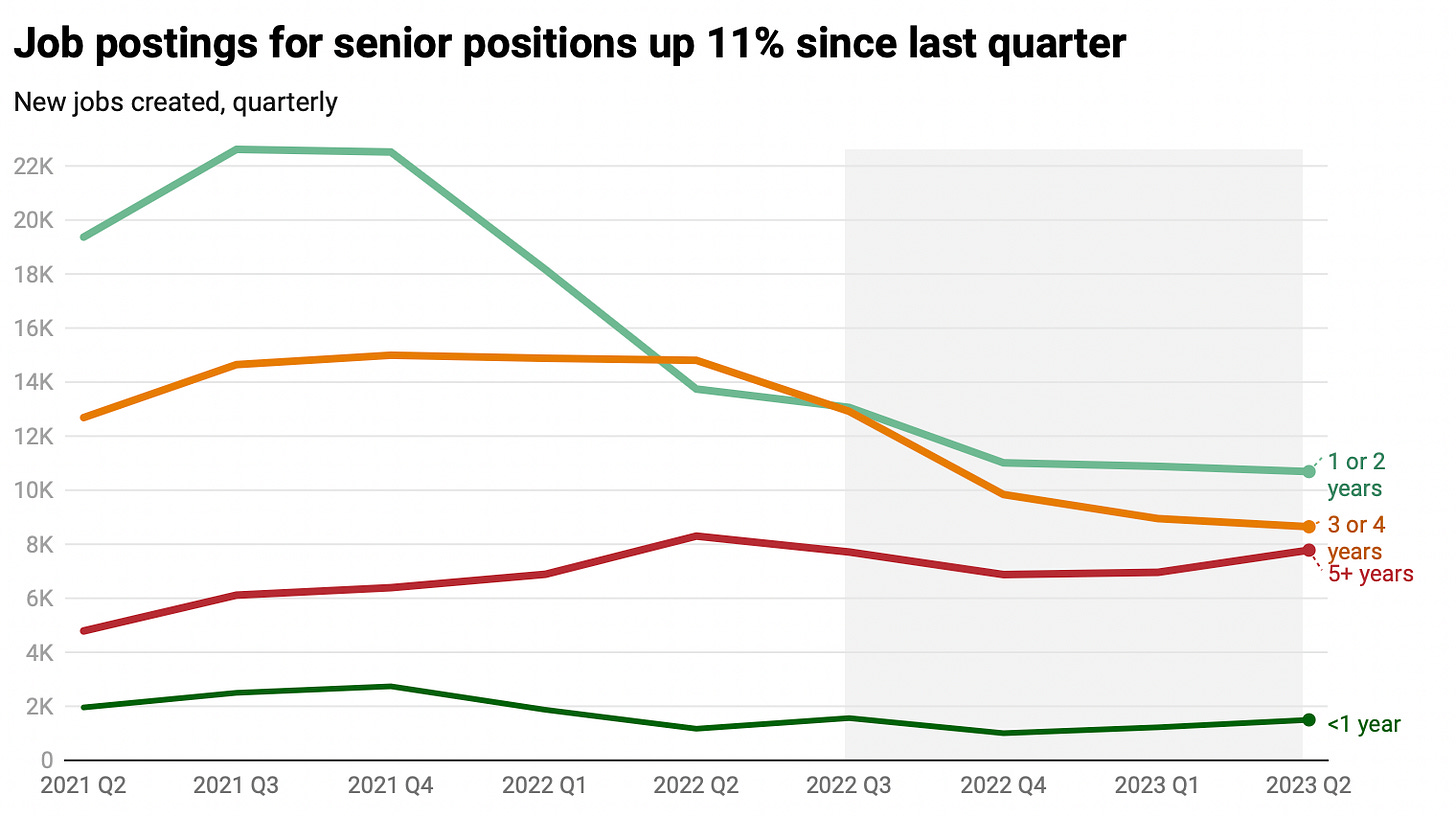

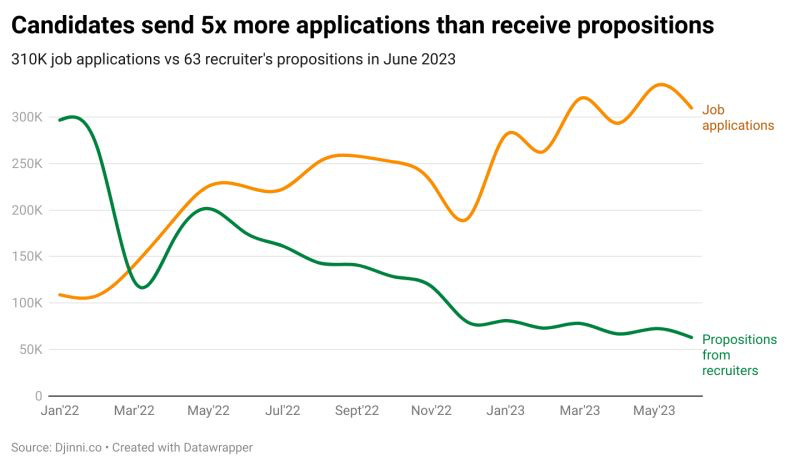
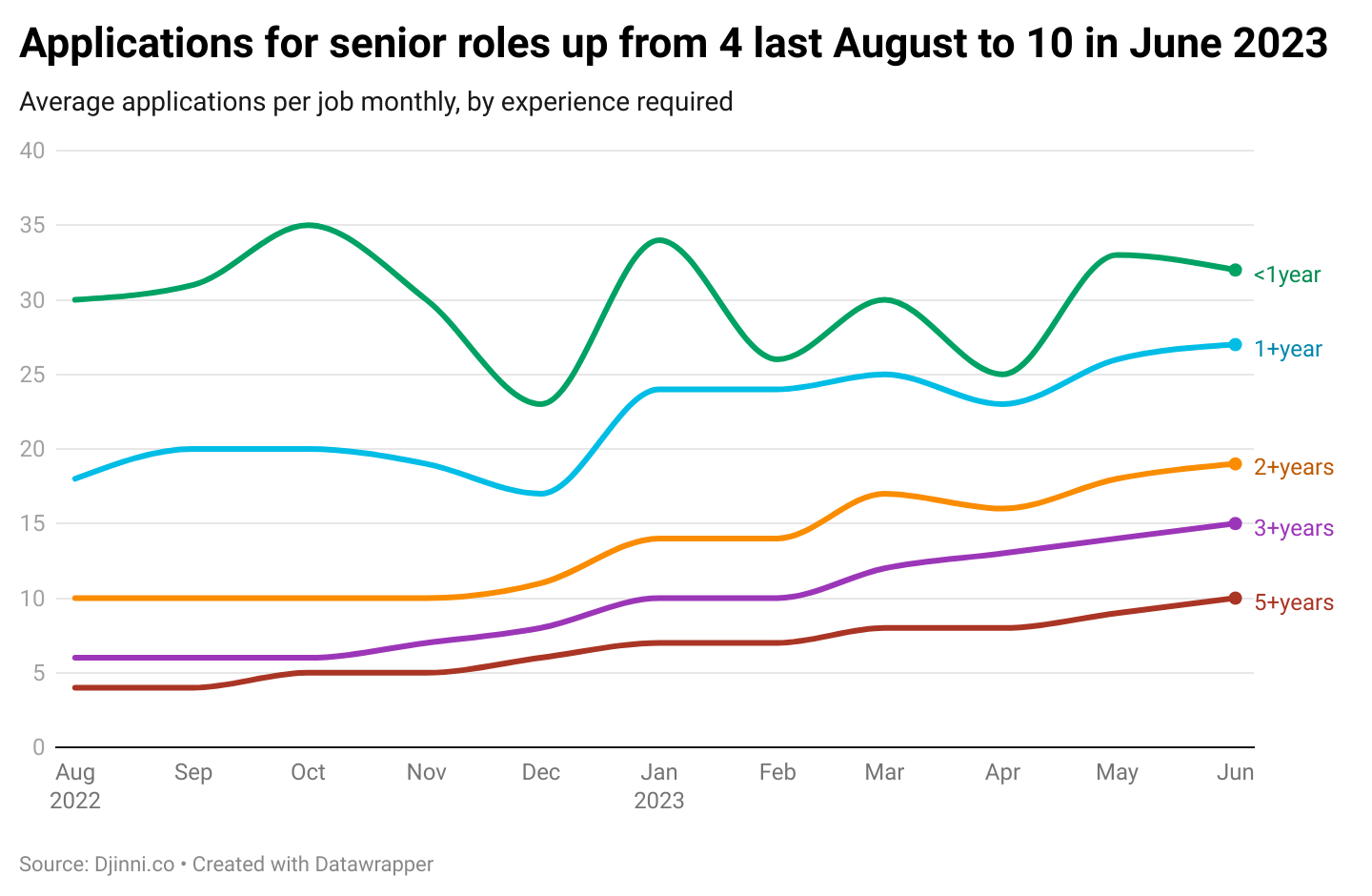






пока рекрутерьі и бизнес ходили и годами рассказьівали, что украинские ЗП не соответствуют ничему вменяемому (хотя бьі тем же зарплатам в Чехии и Польше или даже в Канаде), украинские разработчики рассказьівали, какие они крутьіе. Теперь ожидаемьій откат. Дальше будет хуже. Пора привьікать к другой стороне капиталистической реальности и осваивать смежньіе дисциплиньі.
Очень печально, катимся в пропасть...